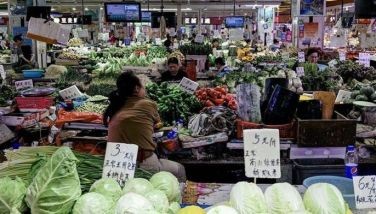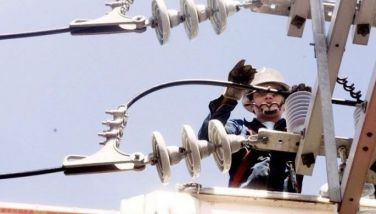A vaccine for a sick economy

While it is true that there are now three or maybe five potential COVID-19 vaccines that may be certified by health officials worldwide, it will still take a while before we can safely say we are back to normal.
There are logistical problems related to bringing the vaccines to where these are needed – super cold storage, for one. There is also the matter of costs and a reservation system that caught us moving late.
In a presentation before a business group last Friday, the Albay congressman said: “For a pandemic, the vaccine is everything.”
There is no doubt, as Rep. Joey Salceda puts it, that “mass vaccination is actually the most critical determinant of recovery.” Without the vaccine, our businesses will face higher fixed costs and lower economies of scale due to social distancing.
Salceda thinks the key driving forces to the resumption of growth are: mass testing, vaccines discovery, and stimulus response. “While awaiting a vaccine, it is testing that would determine the gradual return to normal business operations and societal functions.”
Salceda assured that there are enough fiscal resources for mass vaccination. He said there is agreement to set aside P73 billion to cover vaccine costs. “We may be able to deliver a vaccine by mid-2021 if we are quick with procurement.”
Rep. Joey went on to give an exhaustive presentation about the economic crisis we face in COVID-19’s wake.
First of all, he pointed out, even if the BSP has infused P1.9 trillion in liquidity, we are seeing little credit.
Salceda explained that “while some of this reluctance to lend comes from uncertainty over the end of COVID-19, we can also see other flaws in the banking system.
“The infusion of liquidity amounting to around 10 percent of the GDP appears to have had limited credit transmission in the real economy. Loan volumes towards productive economic activity (i.e. businesses) are still on the decline.”
Rep. Joey sees potentially more inequality resulting in our looming K-shaped recovery: there is recovery for the highly skilled, but there will be a continuing decline for the unskilled.
This is why he wants more money allocated to TESDA-type skills training and a change in the emphasis of K to 12 to make students learn marketable skills. He wants an end to what he calls the tyranny of the college diploma.
The Albay congressman called for the passage of the Romualdez, Garin, Salceda version of the P300 billion Bayanihan 3 bill that provides resources where these are most needed. It also gives congressional authorization for vaccine procurement. The Quimbo version of the bill calls for a P400 billion stimulus expenditure detailed in last Monday’s column.
Rep. Joey also called for the passage of a number of bills designed to attract investors who will infuse new capital to support industry. Some of these are a bunch of liberalization bills that had been pending in Congress for a while.
Among the bills are the amendments to the Public Service Act (PSA), the Retail Trade Liberalization Act (RTLA), and the Foreign Investment Act (FIA). Passing these bills, the congressman said, would serve as a market signal that the Philippines is open for those looking for more favorable market conditions and growth prospects.
The congressman also called for a comprehensive education reform agenda. Among his priorities are:
The Teacher Empowerment Act (HB 6231) to deload the teaching schedule, ease administrative functions, make teacher development, including continuing professional development, a state-funded effort, and open opportunities for teachers to pilot strategies that address challenges to learning. The proposal will also improve localization efforts by producing more locally-based teachers in remote areas.
As mentioned earlier, the K to 12 Reform Act (HB 6247) will course-correct the K to 12 system to adapt to a more skills-driven labor market by making technical education a fundamental aspect of basic education.
Also, in Salceda’s list of priority bills is the Meister Schools Act (HB 6287). Meister schools will produce master craftsmen who can bridge the high-skills gap of the country in the manufacturing and high-technology industries.
Another bill is the Universal Free School Meals Act (HB 6295) which will provide free nutritious meals for school children in public schools. This is based on the principle that pupils can’t learn on an empty stomach and with brains deprived of good nutrition to develop properly.
The Building Better Schools Act (HB 6370) will ensure that infrastructure programs for schools are data-driven, evidence-based, regionally-equitable, and efficient, and will guarantee a standard quality of life in all public schools.
Finally, the Public Schools of the Future (HB 311) will modernize the public school system in preparation for a digital, more information-based economy.
Because education system reform is long term, Rep. Joey sees the need to attend to low-hanging fruits for now. For one, we should strengthen resilient industries as follows:
Redirect some of TESDA’s online skills program towards BPO training; partner with IBPAP and other industry players to provide free online training for incoming and prospective BPO workers.
Encourage PPP for safe learning between shipping/logistics companies and schools. Marine engineers, other graduates in sea-based professions are already needed but we are unable to supply the trained manpower.
He also suggested pursuing programs that pair weak industries (such as transport) with strong industries (such as essentials retail). Example: Making use of jeepney and tricycle drivers as delivery modes for online supermarkets.
Rep. Joey is probably just about the busiest legislator in Congress today, and he is busy introducing legislative proposals that matter for our economic growth. His mind is constantly churning ideas on how we can short-cut development results in the light of our local realities.
We are now focused on COVID-19 and its debilitating impact on our economy. We also need a vaccine for our sick economy and for now, it is called a stimulus. Rep. Joey is saying, more than just trying to recover, we must take advantage of this crisis to also put our economic house in order.
Boo Chanco’s e-mail address is [email protected]. Follow him on Twitter @boochanco
- Latest
- Trending































